Boxed panettone has nothing on this recipe. Make your own fruit-studded panettone bread for the holidays, either for gifts or your own snacking
Most of us in the U.S. see mountains of boxed panettone at nearly every grocery store around the holidays. But the fruit-studded bread with a high dome and airy crumb deserves much more than those dry versions. By the slice, this Italian staple is especially good with an after-dinner espresso. Any leftovers make exceptional French toast or bread pudding.
Here’s the lowdown on the festive bread, plus a panettone recipe to make your own version. You’ll never go back to boxed bread again.
What is panettone?
You know it’s the Christmas season when panettone sits at the end of the grocery aisles. Pronounced “pan-eh-toh-neh,” the Italian sweet bread is no fruit cake. Light and poofy, slightly sweet and buttery, filled with fruit and sometimes nuts, the Italian staple is festive and delicious—and it can be served for dessert or breakfast.
Panettone starts with a soft, brioche-like dough that needs to proof overnight. Baked in a paper liner or mold, the finished bread is easy to wrap and tie with a ribbon for a gift. The trick to getting the classic shape is to hang the bread upside down to cool. Other than that, you can add in whatever dried or candied fruits you like to make it your own.
Panettone origins can be traced back to the Roman Empire, but Milan is the birthplace of the more modern, boxed variety we see today. In the early 20th century, Italian bakers started making the breads for wider market appeal, packing them in colorful boxes with ribbons for easy gifting. And while boxed panettone makes a nice food gift, homemade panettone is even better.
Is panettone a cake or bread?
Panettone is more bread than cake but is easily mistaken for the latter. We blame fruit cake. Dotted with raisins, candied citrus and sometimes nuts, many think panettone is similar to the rich, dense, heavily spiced Christmas dessert. Instead, panettone bread is light and airy with a high dome, crispy top and fluffy interior.
How to Make Your Own Panettone
Ingredients
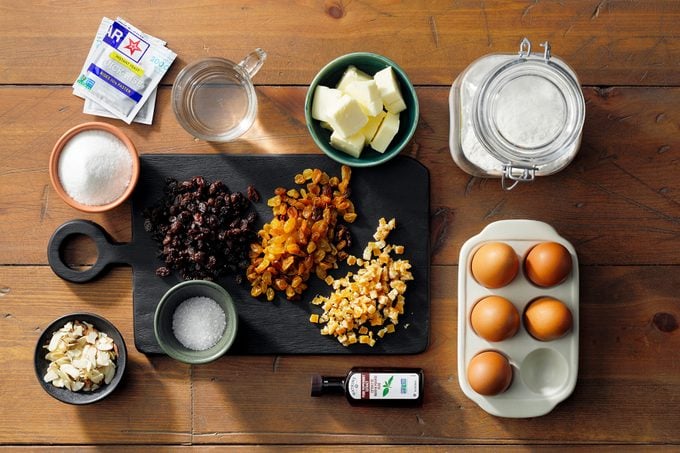 TMB STUDIO
TMB STUDIO
5 cups all-purpose flour, divided
1 tablespoon quick-rise yeast
2/3 cup warm water (110 to 115°F)
1/2 cup sugar
2 teaspoons vanilla extract
1 teaspoon salt
5 large eggs, room temperature, lightly beaten
3/4 cup butter, softened
1/2 cup raisins
1/2 cup golden raisins
1/4 cup chopped candied orange peel
Topping:
1 large egg
1 tablespoon water
1/4 cup sliced almonds
1 tablespoon coarse sugar
Tools
Paper molds: These paper molds from Novacart are perfect for this panettone recipe. Not only do they help keep the bread shape nice and round, they’re easy to skewer for the cooling process. Also they make the breads look nice and professional when gifted!
Metal skewers: You’ll need a good sturdy skewer in order to hang the panettone upside down for cooling. These metal skewers are perfect. You can also use wooden or bamboo skewers.
Digital thermometer: The Thermapen One is our Test Kitchen’s preferred digital thermometer for all grilling and baking needs. This helps you know when the panettone can come out of the oven.
Directions
Step 1: Make a sponge
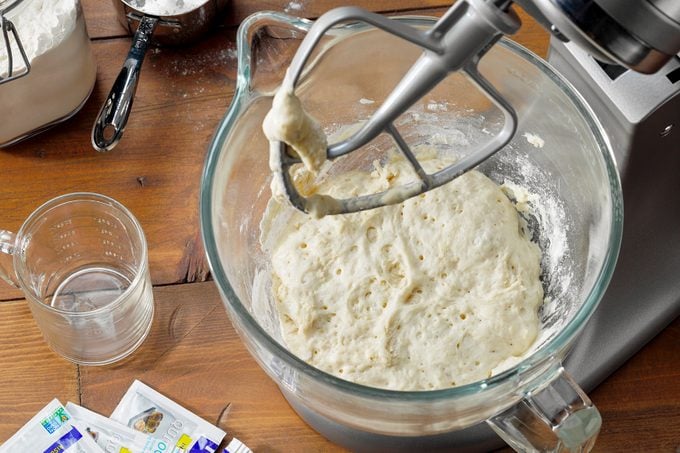 TMB STUDIO
TMB STUDIO
In a large bowl, combine 1 cup of flour, the yeast and warm water. Cover the bowl and let the yeast mixture stand until doubled, about 30 minutes.
Step 2: Make the dough
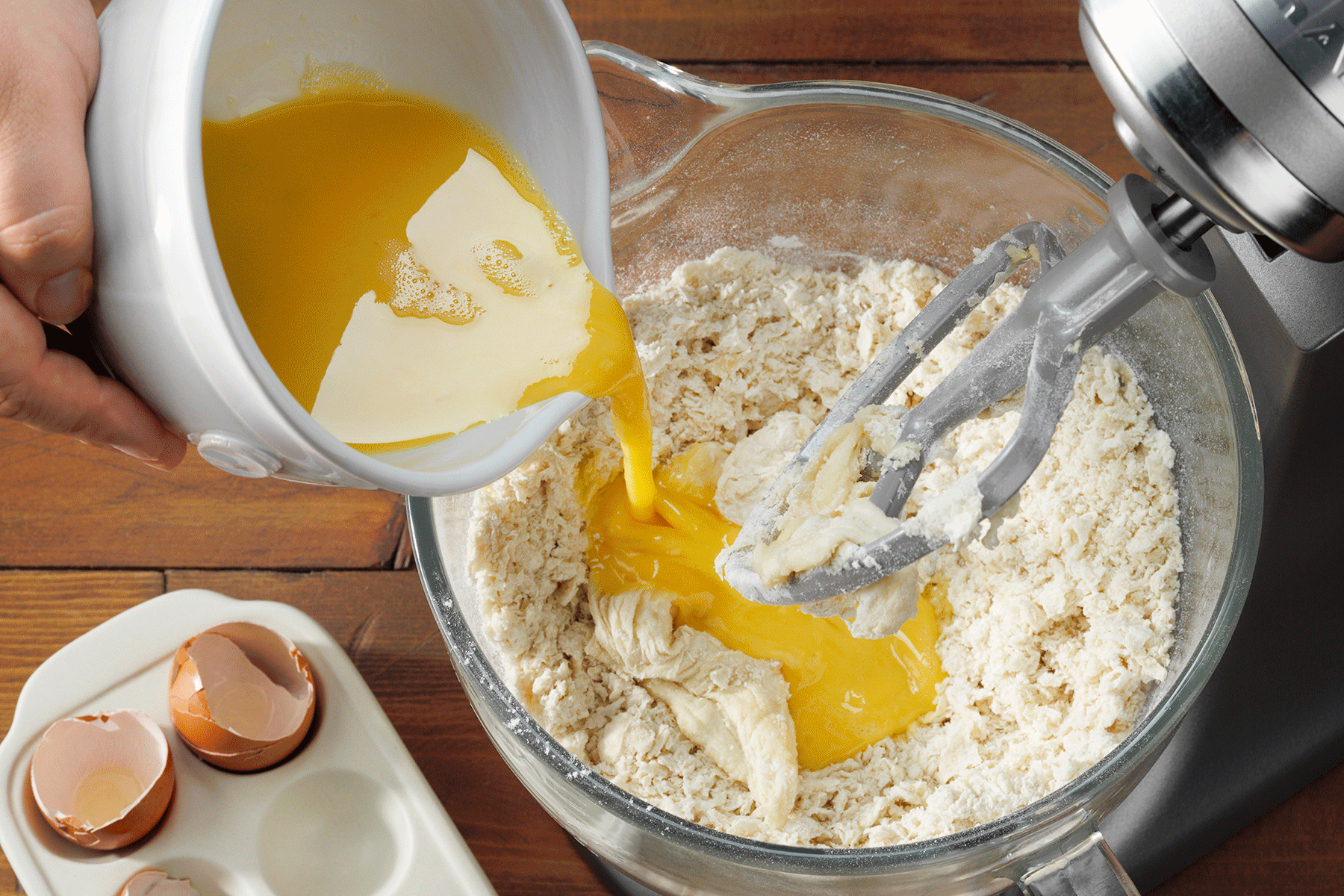 TMB STUDIO
TMB STUDIO
In the bowl with the sponge, gradually beat in the remaining 4 cups of flour, plus the sugar, vanilla and salt. Beat in the eggs until blended. Switch to the dough hook on your mixer, and mix on medium speed until a smooth stiff dough forms, about two to three minutes. Beat in the butter, 1 tablespoon at a time, mixing well after each addition. Beat the dough on medium speed for another 5 minutes, then stir in the raisins and orange peel.
Step 3: Give the dough a rest
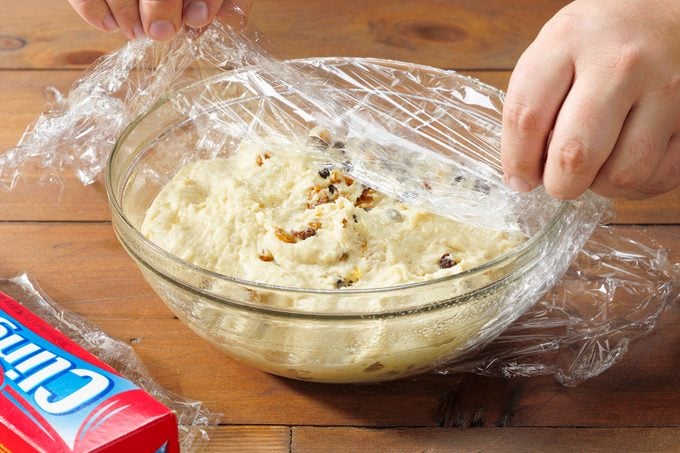 TMB STUDIO
TMB STUDIO
Gently transfer the dough to a greased bowl (it will be sticky), and cover with plastic wrap. Refrigerate the dough overnight.
Test Kitchen Tip: With a longer rise in the fridge, the yeast gets more time to do its work. The fermentation process happens more slowly, which adds flavor and flexibility to the dough. It helps with shaping the dough the next day, and makes it taste great.
Step 4: Shape the dough
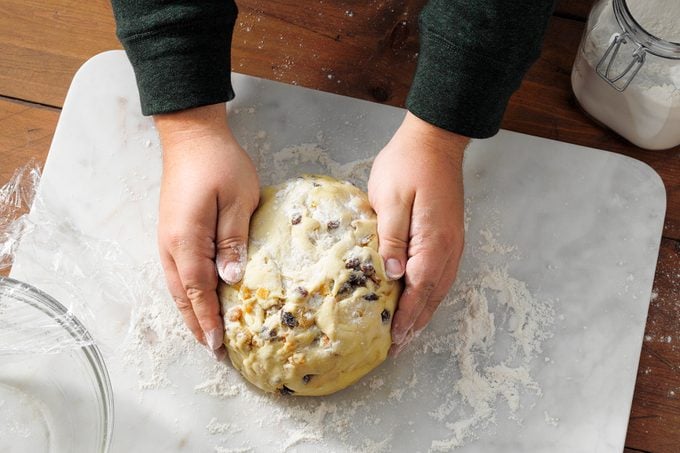 TMB STUDIO
TMB STUDIO
Turn the dough onto a lightly floured surface, and gently shape into a ball. Place the ball in a 7-in. wide x 4-in. tall paper panettone mold. Cover and let the dough rise in a warm place until it’s almost doubled, about 90 minutes.
Test Kitchen Tip: If you forgot to order the paper molds, you can also use a 10-in. cake pan with high sides, or even a 9-in. tube pan. But make sure to use parchment rounds in the bottoms.
Step 5: Bake the panettone
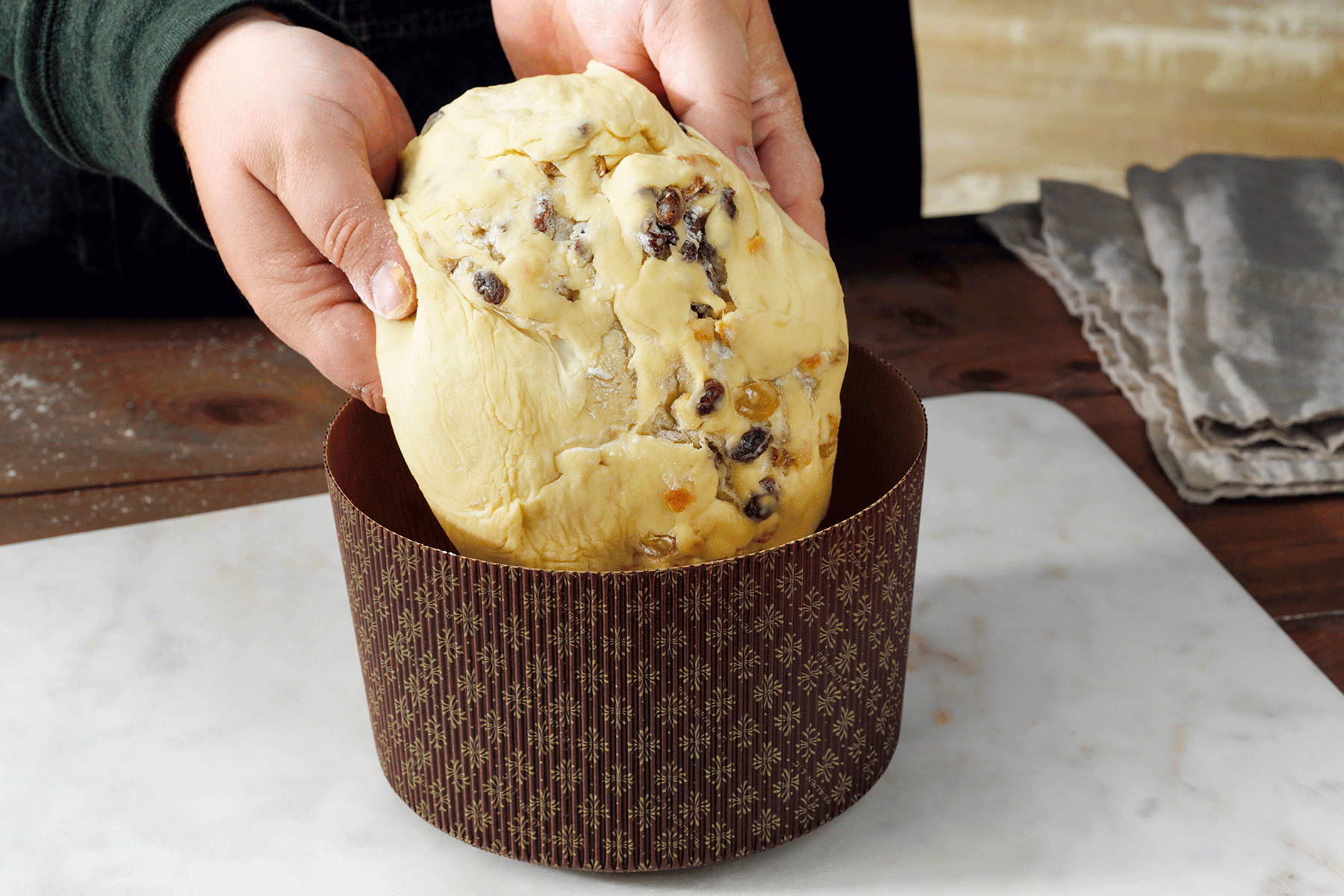 TMB STUDIO
TMB STUDIO
Preheat your oven to 350°. Lightly beat the egg and 1 tablespoon of water. Gently brush the egg over the dough and sprinkle with almonds and coarse sugar. Bake the panettone bread until it turns a golden brown, about 1-1/4 to 1-1/2 hours. To prevent the bread from getting too brown, cover the bread with foil after about 30 minutes or halfway through.
Test Kitchen Tip: To test the bread for doneness, first check the look. It should be deep brown but not burnt. Then sound: Tap the bread; you’re looking for a hollow sound. You can also check the temperature. A finished bread will read around 190° when a digital thermometer is inserted in the middle.
Step 6: Cool the bread
Insert a metal or wood skewer horizontally through the center of the loaf. Allow the bread to cool, upside down, by resting the ends of the skewer on the tops of two large heavy cans.
Test Kitchen Tip: Panettone is cooled upside down to keep the fluffy bread from collapsing. It helps retain the texture and crumb that makes panettone so special.
Tips for Making Panettone
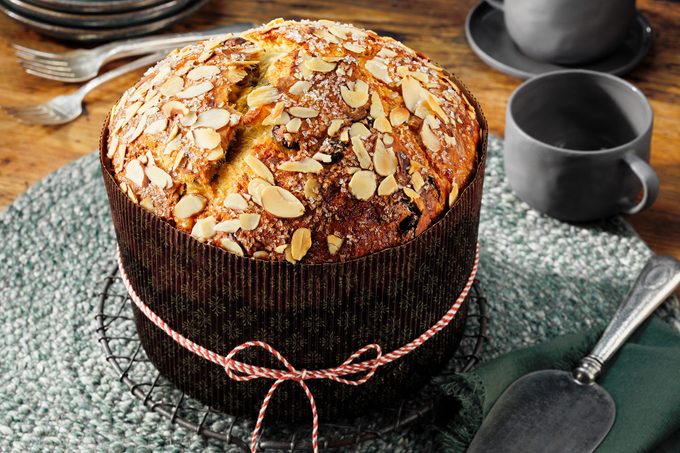 TMB STUDIO
TMB STUDIO
How do you slice and serve panettone?
Because it’s slightly sweet and studded with fruit, panettone bread is fantastic for dessert or breakfast. The traditional way is to cut it into wedges (you can even cut it with the paper on!, but you can also go for slices that could fit into a toaster. Slather with butter or not; some people eat it with a dollop of mascarpone.
How do you store and freeze panettone?
Once the panettone is completely cooled, you can wrap it in plastic wrap or aluminum foil, and keep it in a resealable bag. It will last up to five days on the counter, but it will start to dry out before that. Panettone can be frozen, as well. Wrap the cooled bread in plastic wrap and then foil and store in the freezer for up to two months.
What are some variations of panettone?
Panettone can be flavored according you own personal preference. Add more candied citrus or less, swap in lemon for orange or vice versa, or add both. Chocolate chips are a delicious addition. Raisins or even currants can be amped up or eliminated.
What can you do with leftover panettone?
This panettone recipe is so good, there’s little chance any will be leftover. But if there is, like many brioche breads, it makes the best French toast or bread pudding, including this Black Forest panettone bread pudding.
>>> Read full article>>>
Copyright for syndicated content belongs to the linked Source : TasteOfHome – https://www.tasteofhome.com/article/how-to-make-panettone/










